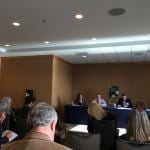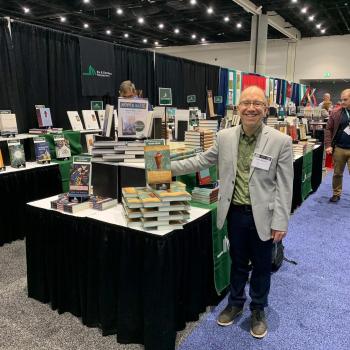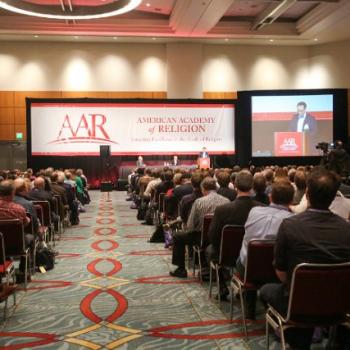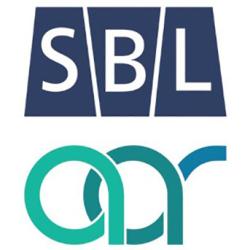I was delighted to attend the NetVUE (Network for Vocation in Undergraduate Education) pre-conference workshop in San Diego last month. The Religion program at Butler University has been exploring the possibility of offering a minor in interreligious engagement ever since I read an article by Eboo Patel proposing an interfaith curriculum, and I realized that we already offered almost every class listed there (or something very close that could become what was listed with minor tweaking). In the context of Butler University, it would have room for interfaith in the strict sense, but would focus more on interreligious engagement, not presuming that students and faculty connected with the program would be coming from a faith perspective, but also helping those whose interest is to navigate religious diversity in the workplace, whether as educators in a K-12 classroom, healthcare professionals, or anything else. The workshop in San Diego focused on the relationship between vocational exploration and interreligious studies as well as religious diversity. It emerged out of a recognition that the language of “calling” still resonates with students, and yet not always in the same way, while “vocation” ranges from being meaningless to being perceived as referring explicitly to going into the priesthood.
The various panelists and speakers were fantastic. C. Hannah Schell started things off by sharing that in the past she would have said no, vocation doesn’t have a place in religious studies classrooms. Colleagues in small liberal arts college may not understand what Religious Studies is about, assuming it is teaching from a religious perspective in a way that advocates it. As faculty who want our field to be recognized as rigorous and secular, we can be defensive and try to appear objective. After sharing some details about her own institutional context, she mentioned a key influence that has shaped and changed her thinking:
Barbara Walvoord’s work on what has been called “The Great Divide”: students take our classes for quite personal reasons, while faculty focus on critical thinking, history, etc. There is not only a disconnect; the aims can be viewed as at odds with one another. Yet Schell discovered these are not mutually exclusive goals. Getting students to write reflections at the beginning, middle, and end of a course, she learned so much about students as a result. Students came to see her during office hours just because she asked why they were taking the class, and what they got out of it. An upper-level course that explored vocation also proved very popular. Getting tenure helped, as did getting comfortable in own skin as scholar-teacher-mentor. On this see also
Emily Gravett’s article about the great divide and student motivation in the Wabash Journal of Teaching and Learning.
Matthew Sayers offered his perspective working in a Religion Department rather than Theology. They wanted (as we sought to a while back at Butler) to get rid of the problematic terminology “Western” and “Eastern” religious traditions. As an atheist and an ex-Catholic, he was very aware of the baggage associated with the word vocation. He said at one point, “My religion is being a professor.” He also drew a helpful comparison with the baggage the word “myth” has for students, and the fact that academics cannot just eliminate students’ assumptions and prior knowledge in such instances. Students are hungry for purpose and meaning. His initial response was “hell no, that’s not my job.” But academics not only can but do teach values, and what we teach and how we teach it embodies values. When he teaches a First Year Experience class, “Faith and Doubt in the 21st Century,” he provides armbands that say FAITH and DOUBT. They take 5 minutes and focus on the words and concepts. He asks them to wear the one they are feeling more strongly on their dominant arm in subsequent classes. His aim is not to tell them what to believe but help them reflect on why they believe what they do. Some do sterile papers. But some really engage, and wrestling with readings that challenge their religious assumptions, students’ minds are blown when they learn that all but two of the authors they read are Christians. They thus learn about diversity within their own tradition as well as more generally. Sayers brought the
IFYC (Interfaith Youth Core) Teaching Interfaith Understanding workshop into the picture. He asked whether we are worried about atheist students losing their unfaith, the way we sometimes worry about Christians losing their faith. He suggested that if students realize the power of critical thinking, they will want it too. How can we encourage individual reflection while avoiding narcissism? How do we not only acknowledge but respond to power dynamics in classroom? What lenses get between you and the thing you’re studying? “You as the professor” is one of the answers – you assign the readings, etc. Mention was made of
“Body Ritual Among the Nacirema” which you should acquaint yourself with if you’re not familiar with it. It is an attempt to describe American culture from an outsider anthropologist’s perspective. It helps to raise questions of outsider/insider vantage points, as well as issues of subjectivity and objectivity. Sayers was quite astonished that students – including religious students – assumed he was more objective because he is atheist!
John Barton offered a straightforward affirmative to the question, seeking to “lift the hood” on a matter that many assume functions in a particular way but do not look closely at. As a Christian professor, matters of vocation interweave with a lot of what he does. He told us quite a bit about his university context. Pepperdine is “robustly Christian,” with clear public faith affirmations, and a low church Protestant campus culture. In some ways it is similar to Biola or Wheaton, but in other ways it is far more diverse, and it is non-creedal when it comes to faculty hiring (with one major exception). They have diverse students and faculty but a Christian majority nonetheless. Interestingly, they are not eligible to be members of CCCU. They are deemed not to be religious enough, and some pieces are not in place that are requirements of membership. Conversely, declined by Phi Beta Kappa because they are too religious. “Welcome to the Pepperdine Experiment.”
Vocation and religion, understood broadly, seek to get at ultimate concern and human fullness. Barton takes a Wittgensteinian approach, feeling hesitation and resistance when talking about vocation – or religion for that matter, even though he teaches World Religions. Considering the prospect of changing a course title usually settles the matter for him just because of the paperwork involved. Is a course title misleading right from the beginning, and if so, is that OK? Both religion and vocation are framed by a Protestant Christian (Lutheran) heritage. He is not complaining about it, merely acknowledging it. His perspective might be termed “soft resistance,” and that may be because he is an insider. He is not sure what to do with that, precisely because he cannot see the matter precisely as others do from other vantage points. But at any rate, students have a sense of what “world religions” is, and he invites them in. Changing the name would simply lead to most of them not finding it in the catalog.
Barton rejects any notion of a sharp division between theology and religious studies. He prefers to talk of situated objectivity, and of comparative theology rather than comparative religion. He mentioned the hermeneutical trends of continental philosophy, acknowledging that any analysis of historical realities itself comes out of a place of historical situatedness. His perspective vacillates or perhaps better cycles between analytical, historical, and autobiographical perspectives, and invites students to do the same. These perspectives are distinct but interdependent. There is no neutrality, yet he also wants to avoid purely subjective spin. Trying to walk that tightrope is a worthwhile endeavor.
In seeking to maintain that tightrope walk or dance between analytical experiments and vocational reflectiveness, Barton invites students to assess him: that is the point of declaring his own standpoint, rather than it representing a place that students are expected to simply try to arrive. Some Christian parents don’t like this, they want religion professors to provide clearer assertions rather than exploration. Barton acknowledged that the end of semester assignment to assess him hasn’t gone well. There is no such thing as non-local neutrality, but can one achieve of aim for “pedagogical neutrality”? Barton pursued this, not telling students where he is coming from in order to avoid short-circuiting their exploration. But ultimately he chooses to err on side of transparency when push comes to shove. The choice to approach things this way is itself a kind of situatedness and reflects his stance and identity. He is a white male Christian, and aware of the fact. He himself offsets assumptions about the normativity of his viewpoint and thinking. He tends to think that in religious studies, the better mistake to make is on the side of location, identifying ourselves, in conversation with others. If students detect where he is coming from too early, it shuts down conversation.
During the Q&A there were fascinating questions and mentions of specific readings and how they’ve worked in classes. For instance, William Jones’ “Is God a White Racist?” One of the panelists emphasized that they don’t assign anything just for one reason. They emphasized that processors can use our privilege to our own advantage or to the advantage of students. When students speculate on the motivation for assigning particular readings, the motive they miss most is that the professor is a PhD assigning an academic as reading. A key question is “How do you pull back the curtain when you’re the one behind the curtain?” Can we effectively be both the Wizard of Oz and Toto? At Pepperdine religion is the one exception where there is a hiring requirement (statement of faith). They thus cannot pretend to be neutral. Barton shared that there is tension within his division because of how he postures himself. We asked whether it possible to avoid marginalizing anyone. Barton said he reaches out to any students who shares their identity when touching on their tradition. Like math, this is simply “showing one’s work.” Tillich was brought into the picture as it was suggested that our inability to talk about politics civilly shows that it has become our ultimate concern. Someone else suggested the reason we cannot talk about religion and politics is that people think they know about these topics when they don’t. Critical thinking is about finding the balance between locatedness and truth.
More than once the loaded Christian language of hospitality came up – welcoming others suggests you have ownership and others are your guests. On the other hand, ultimately we cannot divest ourselves of privilege. We can share power. One example is male colleagues having students call them by their first name. This hides rather than eliminates power difference, and may negatively impact female faculty who do not have the privilege of doing likewise while maintaining student respect. Barton was asked how much the invitation to students to assess him as professor depends on a certain situatedness and homogeneity of the student body? Someone else asked about female students whose fathers say they cannot pursue a certain vocational path. Do we respect the family’s tradition, or the student’s autonomy? Either choice reflects certain values rather than some value-neutral, supposedly objective stance. We may try to help students who think they can do anything see their own limits and situatedness, and be at cross purposes with first generation college students who are aware of their own situatedness and need encouragement to believe they can achieve great things and need to learn to dare to take risks. Different professors have different experiences, as do different students. Think about the immigrant experience and the struggle and sacrifice some undertake to come to US and send their child to university. In some contexts this makes open-ended exploration of vocation anathema. Their family values say they should become doctors or lawyers, enter the middle class, and provide for their parents. Religious studies can help us with this since it intersects with culture at points like this: and at the same time, precisely in the act of honoring father and mother, majoring in Religion may not be natural for children who are being pushed towards high-earning professions. Even so, honoring parents and becoming a doctor can still be a focus of vocational reflection and work in harmony as students become aware of some of these values that may simply be implicit and taken for granted.
I will continue the recap in another post. In the meantime see also the post below related to this topic:













